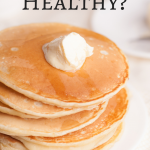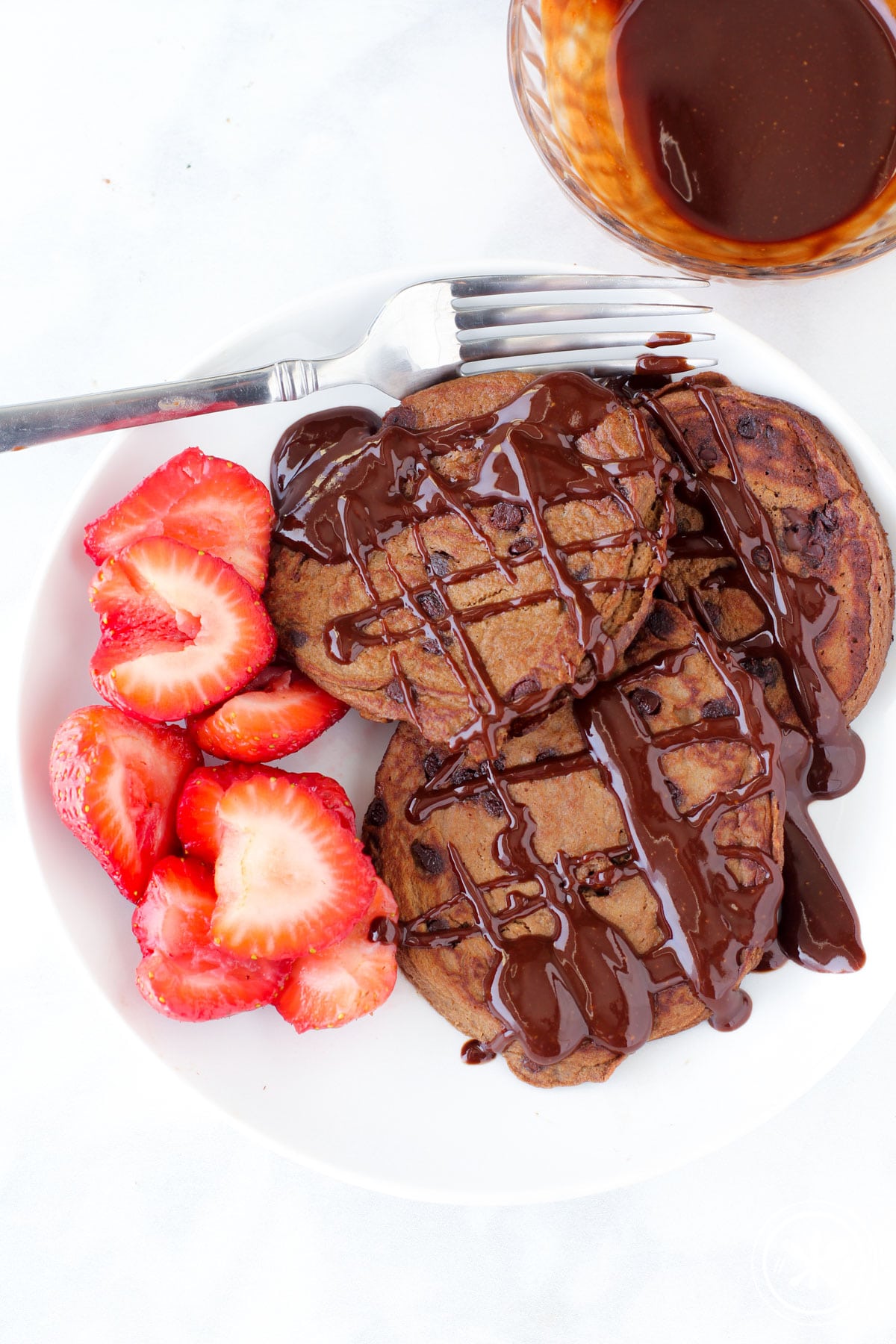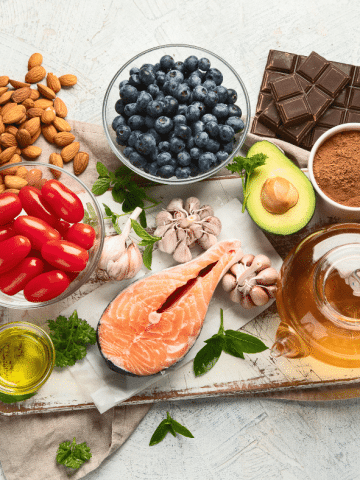I often get questions from my nutrition clients and students about whether certain foods are healthy. One question that comes up a lot is whether pancakes are healthy, or not. So today, I'm going to answer this question as I would if a client or student were asking me! Let's dive in.

First, you should know that I have an "all foods fit" approach. I refrain from using healthy/unhealthy or good/bad with my kids and clients. Instead, I use the words nutrient-rich or energy-rich to describe food. There are all kinds of reasons people choose to eat a particular food, including taste, context, health, emotion, and much more, that are all valid. I think what matters is that we know why we chose certain foods over others, and we look at not just one item but the meal overall.
So, let's start with what pancakes are made from.
What are Pancakes Made From?
Traditional pancakes are made from:
- flour
- egg
- milk or buttermilk
- butter
- baking powder
- sugar
The largest ingredient by volume in this list and the biggest offender is flour. Typically all-purpose white refined flour is what is used in pancakes. Except for special occasions, you should make most of your WHOLE grains. That's because whole grains have significantly more fiber, nutrients, and protein than refined grains made up of starch that quickly turns into sugar. Whole grains are nutrient-rich whereas refined grains are energy-rich only. So a quick swap of whole wheat flour in a traditional pancake recipe quickly adds more nutrients to pancakes, without drastically altering the flavor or texture, especially if you use whole wheat pastry flour.
And then, of course, you could also try one of the other billion "healthy flour alternatives" pancake recipes on the internet, such as almond flour, oat flour, coconut flour, and more. These alternatives tend to be very nutrient-dense, but caloric values vary widely.
Here are some of my favorite healthy pancake recipes from HH using alternative flours:
- Protein Powder Pancakes
- Oat Flour Pancakes
- Coconut Flour Pancakes
- Chocolate Coconut Flour Pancakes
- Healthy Sweet Potato Pancakes
- Sweet Potato Protein Pancakes
Or try these that don't even contain flour at all:
- Egg White Pancake
- Single Serving Pumpkin Protein Pancake
- Easy Protein Pancake
- Blueberry Cottage Cheese Oatmeal Pancakes
- Carrot Cake Greek Yogurt Pancakes
- Gluten-Free Vegan Protein Pancakes
The rest of the pancake ingredients are healthy parts of a well-balanced diet, but they don't make up much of the pancake by volume, see the nutrition facts.
What are the nutrition facts of pancakes?
1 (6-inch traditional pancake) - about the size of your palm
- Calories- 175
- Total Fat: 7g
- Total Carbohydrate: 22g
- Protein: 5g
Number one, nobody eats just one six-inch pancake. So multiply those numbers by at least 3, probably more like 6. But, let's look at the numbers multiplied by 3.
- Calories- 575
- Total Fat: 21g
- Total Carbohydrate: 66g
- Protein: 15g
Number two, when I try to determine if something's healthy, first I look at the ingredients, but second, I look at how it fits into a meal. The problem with pancakes is that traditional pancakes are made from refined flour (which turns into sugar quickly), and then we pour a ton of sugar in the form of pancake syrup or maple syrup on top. That ends up being a carb-heavy meal. There isn't a ton of balance between protein and fat and carb.
The thing with carbs, especially refined starch and sugar, is that it causes a quick blood sugar spike followed by a dip. The dip makes you feel tired and makes you crave more sugar to rebound. The cycle then repeats. That's why I recommend that if it's a special occasion and you have traditional pancakes, eat 1-2 pancakes alongside some fat and protein like eggs. This creates a more balanced meal, preventing that huge spike and crash.
I don't love "low calorie" syrups as they usually use artificial sweeteners. But you can try alternative toppings on your pancakes, such as nut butter or chia seed jam.

Final Takeaways - Are Pancakes Healthy?
Traditional pancakes are made with refined flour and sugar, then topped with more sugar in the form of syrup. This creates sugar and carb-heavy meal that creates blood sugar fluctuations that aren't great for health in the short term or long term. For "everyday eating," swap all-purpose flour with whole wheat flour to increase the nutrient density or try alternative recipes with nutrient-dense flour alternatives such as oat flour, coconut flour, or almond flour. Save traditional pancakes for special occasions. When you do have them, create a more balanced meal by reducing your portion of the pancakes and increasing other items on the plate, such as protein, healthy fat, and veggies.
And above all, whether you're making traditional pancakes or a "healthy pancake" recipe, for the love of God, enjoy your food. You only live once.
You may also like:
- Are peanut butter and jelly sandwiches healthy?
- Do bananas have too much sugar?
- Grocery Shopping 101: Cooking Oils
- Grocery Shopping 101: Bread
- Grocery Shopping 101: Dairy







Leave a Reply